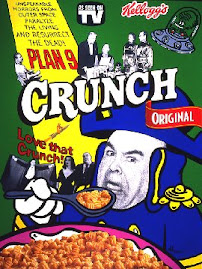By Doug Gibson
Let's face it, in America at least, to most cult movies fans, Arthur Lucan (AKA Old Mother Riley), is a footnote, the eccentric co-star with Bela Lugosi in the 1952 British film "Mother Riley Meets the Vampire." Watching that film, which is on YouTube, Lucan's pantomime dame is frankly, a "whirling dervish" of energy, prancing around the sets, singing songs and speaking 300 words a minute in the working-class dialect.
He's a talent, there's no doubt about that, but a strange one to U.S. viewers, or contemporary viewers today, because his chief skill is a largely forgotten one. As mentioned, Lucan was a "pantomime dame," a not uncommon feature of the British stage and music halls of the first half of the 20th century. "Old Mother Riley" was not a drag act, or geared toward gay audiences. It was comprised of comedy sketches, many of which were bathed in pathos and social messages, explains Robert V. Kenny, author of the new biography, "The Man Who Was Old Mother Riley: The Lives and Films of Arthur Lucan and Kitty McShane (Bear Manor Media, 2014) here.
Arthur Lucan (1885-1954) was married to Kitty McShane (1897-1964), who he described as his Irish beauty. Unfortunately, after a few years of marital bliss, it turned into a dysfunctional nightmare with the mild-mannered Lucan eventually becoming a kept cuckold in his own home, with McShane, who by most accounts exhibited sociopathic behavior, taking control of the money, bankrupting the couple and using her lover, actor "Willer Neal," as her co-star in "The Old Mother Riley ..." films that she starred in with Lucan. I often seriously wonder if there is an entertainer as universally disliked by those who knew her, and historians, as Kitty McShane. Kenny's account of their lives only seems to add more evidence of her malice, insensitivity and drunken cruelties.
The "Old Mother Riley" films, though, were a huge success prior and during World War II as topics such as the war, war profiteers, parliament, the rights of the poor, and even relations with Ireland were explored within the comedies. The basic premise stayed the same: Lucan played widow Old Mother Riley with McShane as her daughter, who was always seeking romance and usually found it. British audiences loved Lucan and McShane, who had developed the characters, if not with the same name, as early as the 1920s. However, Kitty McShane's narcissism led her to continue to play the "young daughter" in the post-World War II films, despite that she had become a plump matron.
Lucan honed his skills at the turn of the 20th century, learning a lot from a family of actors he lived and worked with prior to going out on his own and marrying McShane. Kitty McShane's pleasant voice and young good looks made the team very popular. One of their first skits, called "Bridget's Night Out," featured pantomime dame "mother" Lucan fretting over "daughter" Kitty's late night out. As Kenny explains, these skits not only were meant for humor, but tapped into the fear in those times of how a wayward daughter's life could be ruined if she was taken advantage of by a man.
I can't adequately explain Lucan as a performer except to say again that he is clearly talented in what he does. On YouTube, there is an early skit with Lucan and McShane that is similar to "Bridget's Night Out." It's heavy on pathos as well as comedy and one can't help but marvel at Lucan's skill, even if it's hard for us to comprehend. Watch it here but note that despite the title card, Lucan was not known as Old Mother Riley at the time (1936).
At their peak, with many movies and a performance in front of the Royal Family in Britain to their credit, Lucan and McShane were very rich, the equivalent of millionaires. McShane blew the money with excess spending and bad investments. Her behavior became so abominable that by the early 1950s, the pair, while married, had split; hence the reason that there's no Kitty McShane in "Mother Riley Meets the Vampire."
Kenny's book still fails to capture the dysfunctional but stubbornly durable connection between Lucan and his wife. Perhaps we'll never know why he put up with her cruelty, that extended to violence on occasions (Once her boyfriend Neal beat Lucan mercilessly). According to Kenny, McShane stopped -- in the late 1920s -- plans for Lucan to team with a comedian in U.S. films because there was no planned role for her.
As it was, Arthur Lucan eventually died as he lived most of his life, in a theater, collapsing while preparing to play his most famous character, pantomime dame Old Mother Riley. As for Kitty McShane, her career was more or less over. She lived almost 10 more years, in increasing squalor, and died shortly after her boyfriend, Neal, passed away.
Today, Arthur Lucan has been rediscovered in Britain and his grave is well cared for and there are occasional analysis of his career, which spanned roughly 50 years. Kitty McShane's funeral was attended by a few mourners, and despite knowledge of the cemetery she was buried in, a stone was never placed, and no one is sure exactly where she is buried.
Kenny's biography is superb. He makes a myth out of the idea that some entertainers are too old and gone to find interesting information into their lives. The book captures a period of entertainment history that few know much about, and appreciates the talent of the master of that particular entertainment. Until this book the most Lugosi fans and generally everyone else in the U.S. knew about Lucan and McShane came from a segment in Frank Dello Stritto and Andi Brooks excellent book, "Vampire Over London: Bela Lugosi in Britain."
Watch Mother Riley Meets the Vampire below under a different title.



No comments:
Post a Comment